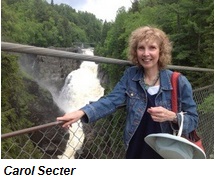By Deborah Ostrovsky
Interview with Carol Secter, BCA-Qc board member, on why she is a Sustaining Donor.

Q1: You're a passionate BCA-Qc donor. There are so many other breast cancer charities out there, so why give to BCA-Qc?
Carol Secter: Because BCA-Qc stands for something—for nearly 20 years—that no other group has given sufficient consideration to: prevention. And when I say prevention, I'm not referring to the standard "change your lifestyle" prevention that so many posit. Not that there’s any reason not to alter some aspects of one's lifestyle, which may make sense for general good health as well as lowering one's risk for breast cancer. But lowering one's risk isn't really preventing breast cancer, is it? That's where BCA-Qc comes in—for nearly two decades we've been putting forth the idea that changes need to be made at the regulatory and manufacturing levels—and we’re not shrinking violets about pushing that message, either. So it’s easy to want to join in a movement that’s working for real change at a fundamental level.
Q2: You're encouraging prospective donors to give what they can—that no amount is too small?
CS: Yes, absolutely. In getting the message out that the environmental links to breast cancer need to be addressed, we need to be sure that we’re reaching a wide group of people. So while large donations are really important, those who cannot afford to commit more than a small amount—and no amount is too small—are also really crucial to us, and let us know that you’re hearing us and that you believe that change is possible. Maybe this year you can only give a small amount. Perhaps another year you'll be in a position to do more. By becoming a donor, you give BCA-Qc both your moral and financial support.
Q3: You are also a Sustaining Donor. What's that?
CS: It means I’ve made a commitment to give a donation every year for a certain amount of time. For me, that’s five years. I’ve been fortunate to find myself with some extra money after we sold our house, and this is the right time for me to step-up more. That could change, but for the next five years, I’m confident that I can spend beyond my pension. And of course, being a Sustaining Donor doesn't need to depend on having a personal windfall—everyone should be giving of their time and/or money to support causes they believe in, and the amount is not important.
Q4: Why is being a Sustaining Donor so important for BCA-Qc?
CS: Like every other nonprofit organization, BCA-Qc has big dreams and a limited budget—so to be able to plan projects, we need a predictable income. That's where Sustaining Donors come in. Their support means that long-term planning can be done because there is dependable funding available to pay for projects.
Q5: What does BCA-Qc do with our donations?
CS: BCA-Qc has created and nurtured a variety of projects that I’ve been involved with over the years; donations go toward developing and sustaining these projects. Over the last couple of years, we’ve used the theme of safer cosmetics and personal care products to explain and emphasize the links between environmental toxins and our health—including, of course, breast cancer.
Recently, we've realized that we especially need to address the concerns of young women and girls. They’re the ones whose exposure to issues about breast cancer has been, primarily, witnessing relatives—mothers, aunts, grandmothers, or their friends’ relatives—deal with diagnosis and treatment. They have not been affected, and neither have their peers (although some U.S. research has shown that more young adult women are being diagnosed than ever before). BCA-Qc’s work with this demographic is important: It’s a group whose body burden of toxic chemicals may not yet be totally set, so primary prevention has real possibilities.
We try to use donations to get our messages out to the public as directly as possible. One example is our project concerning endocrine disruptors, Hands off my Hormones. You won’t see us hosting a gala, and we will never take money from a drug company or anyone associated with the cancer industry or any company whose product is related to the causes of cancer. BCA-Qc is too busy conducting workshops in classrooms, or for workers, or at community and cultural centres—working directly with the women and families we serve.
